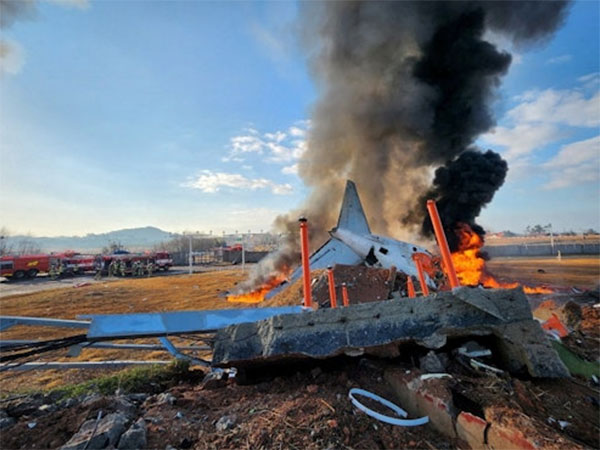
Seoul: A plane crash in South Korea on Sunday killed 177 people and two others missing. The accident involved a Jeju Air passenger jet carrying 181 people, which belly-landed and exploded at Muan International Airport, Yonhap News Agency reported.
This marks one of the worst aviation disasters in South Korea's history, and the worst involving a local airline since the 1997 Korean Air plane crash in Guam, which killed 225 people.
The incident took place at around 9 am when the Boeing 737-800 aircraft, carrying 175 passengers and six crew members, veered off the runway while attempting to land. The plane, which had departed from Bangkok early that morning, skidded along the ground without its landing gear deployed, crashing into a concrete wall before bursting into flames.
Authorities confirmed 177 deaths, while two crew members were rescued. However, two people remain missing, and search operations continued through the night in an attempt to locate them. As of now, 22 victims have been identified.
The crash's aftermath left the aircraft nearly destroyed, making the identification of the victims a difficult task. A firefighting agency official said, "After the plane collided with the wall, passengers were thrown out of the aircraft. The chances of survival are extremely low."
The plane's remains have been severely damaged, and recovery efforts for the deceased are ongoing. Given the extent of the destruction, officials have set up a temporary morgue at Muan Airport to handle the bodies.
The Jeju Air flight had been scheduled to arrive at Muan at approximately 8:30 am, but it crashed about an hour later. Most of the passengers were Korean, except for two Thai nationals.
Among the 181 people on board, there were 82 men and 93 women, with ages ranging from as young as three to 78 years old. Many of the passengers were in their 40s, 50s, and 60s, reported Yonhap News Agency.
Following the crash, only two crew members survived. They were quickly rescued and treated for non-life-threatening injuries at hospitals in Mokpo before being transported to Seoul. The authorities believe that a landing gear failure, potentially caused by a bird strike, may have contributed to the accident.
Just six minutes before the crash, the airport's control tower had warned of a possible bird strike. Moments later, the pilot declared a "Mayday" distress signal, indicating the aircraft was in critical condition.
The South Jeolla authorities quickly raised emergency alerts to the highest levels, mobilising all available rescue and police personnel. Acting President Choi Sang-mok declared Muan a special disaster zone and visited the crash site to direct officials in their search efforts.
He also offered condolences to the victims' families and promised government assistance. In response, the presidential office convened an emergency meeting to ensure timely actions for the search, investigation, and medical support, Yonhap News Agency reported.
Jeju Air CEO Kim E-bae issued a heartfelt apology, expressing deep sympathy for the victims' families. "Regardless of the cause, I take full responsibility as the CEO," Kim stated.
He pledged that the airline would provide all necessary support to the families affected by the tragedy.